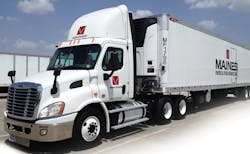Green Fleet of the Month: Plugged in to savings
Even small changes within a fleet can reap big benefits in terms of the environment and dollars on the bottom line. Just ask Conklin, NY-based Maines Paper & Food Service.
Just over one and a half years ago, the fleet began running 33 refrigerated trailers with Carrier Transicold’s Vector 6500 refrigeration units with plug-in capabilities. Those trailers only represent about 6% of the fleet’s 500 or so trailers, but they contribute nearly $300,000 in fuel savings per year.
“We had heard about an opportunity through Cascade Sierra Solutions for rebate opportunities [for plug-in power],” says Bill Gaffney, vice president of corporate operations. “We looked into the units and it seemed like it was a good fit for us. Cascade Sierra was very professional, and they walked us through the paperwork.”
Maines now operates 15 units at its corporate headquarters in Conklin and 18 units in Terrell, TX. The company also has just over 400 tractors as well a number of straight trucks for city operation. Maines, which employs nearly 2,000, is a private, family-owned independent foodservice distributor founded in 1919. Revenues in 2012 exceeded $3 billion.
In both locations, the trailers return to the terminals each night. “They stay on shore power until the drivers are ready to go out again,” says Barry Lingo, transportation director in Terrell. “They spend about nine hours on shore power and nine to 10 hours, depending on the route, on diesel power each day.”
According to Carrier Transicold, its Vector 6500 unit features Deltek technology, which combines a diesel engine, generator, and patented electric technology. The unit does not include maintenance items such as alternators, belts, idlers, vibrasorbers, and shaft seals and has roughly 50% fewer braze joints, Carrier Transicold said. In addition, the Vector 6500 requires 33% less refrigerant charge than a conventional unit, while patented Stealth noise reduction technology provides quieter operation.
Carrier Transicold notes that the unit provides an operational cost savings of up to 70% over conventional diesel units.
It takes between one and two hours to “pre-cool” the trailers on shore power, Lingo adds, and about three hours for loading. The Terrell facility sends about 10 of its trailers with the Vector units out on runs each day, six days a week. The fuel cost savings for the facility in Texas, which services six states, is about $2,000 per week, Lingo says, or about $105,000 per year.
The Conklin units spend between eight and 12 hours a day on shore power with a weekly savings of about $3,700 and yearly of $193,000.
The initial purchase of the units included 17 equipped trailers in Conklin. “When we got the initial group, right from the beginning, the numbers were meeting our expectations,” says Gaffney.
The second purchase was for a new facility in Terrell, so installation of the more powerful electrical source for the Vector units was part of the design to reduce infrastructure costs.
“This was one of those rare times where we could do the right thing and see an [operational cost] benefit at the same time,” notes Gaffney.
Before Maines made the leap, though, there were concerns that needed to be addressed. Reliability and cooling capacity were chief among them. “You can’t tell the difference [in cooling capacity versus diesel units],” says Lingo, adding that maintenance has not been an issue either.
While these units return to their facilities each night to utilize the available shore power, Maines has other vehicles spread among its 12 facilities that make overnight runs where shore power is not available. “We do have some trucks that stay overnight at hotels; [drivers] do not stay in their sleepers,” says Gaffney. “There is a big opportunity there because of how much the sleepers run at night.”
Unfortunately, most hotels at this time do not have the shore power available to power refrigeration units, but it is an area that Maines is very interested in exploiting in the future should the opportunity present itself.
“Anytime Maines can reduce our carbon footprint while lessening our fuel costs, we will aggressively pursue those opportunities,” says Gaffney, who also praises Cascade Sierra Solutions for making the process of switching to the Vector units so seamless. “We cannot stress enough what a great job Cascade Sierra has done through this process. What a great partner they are.”
